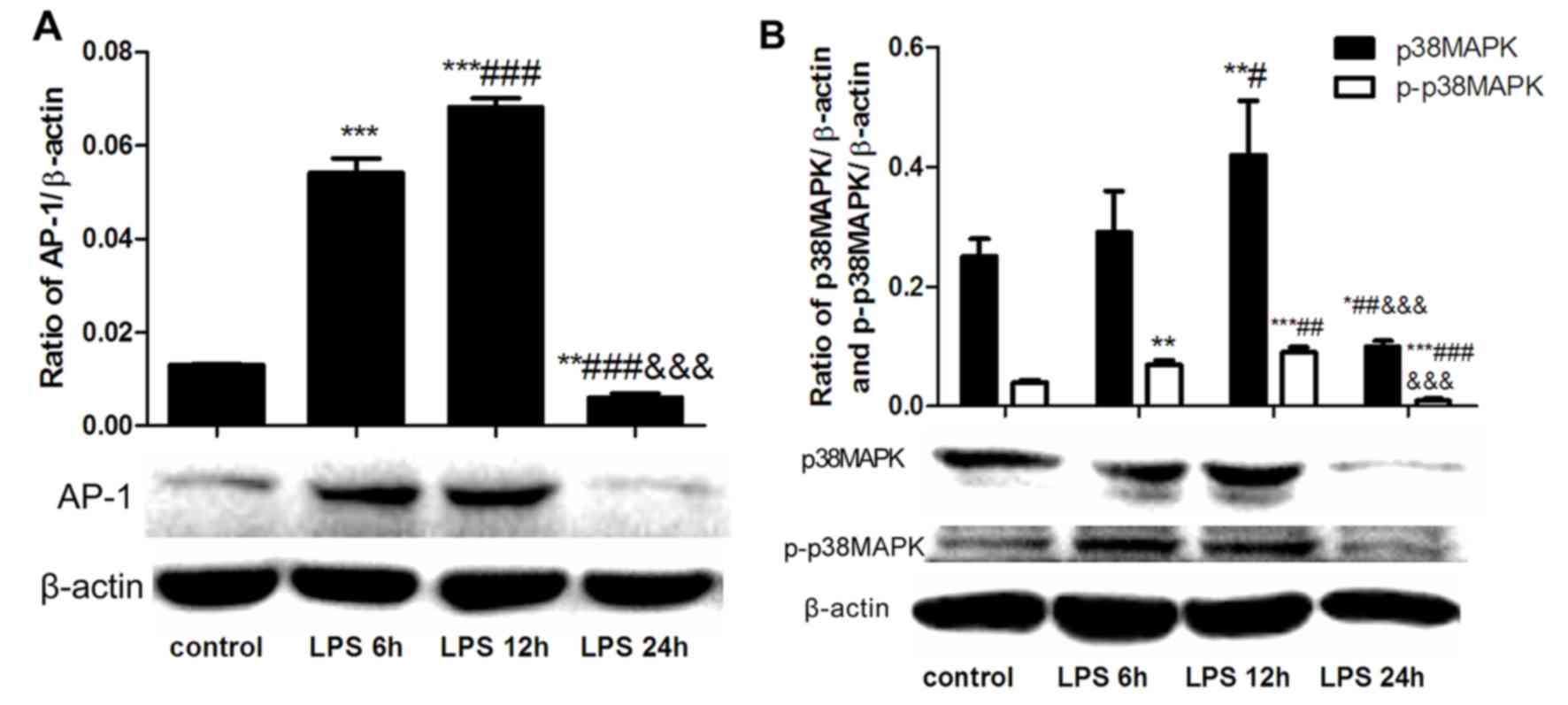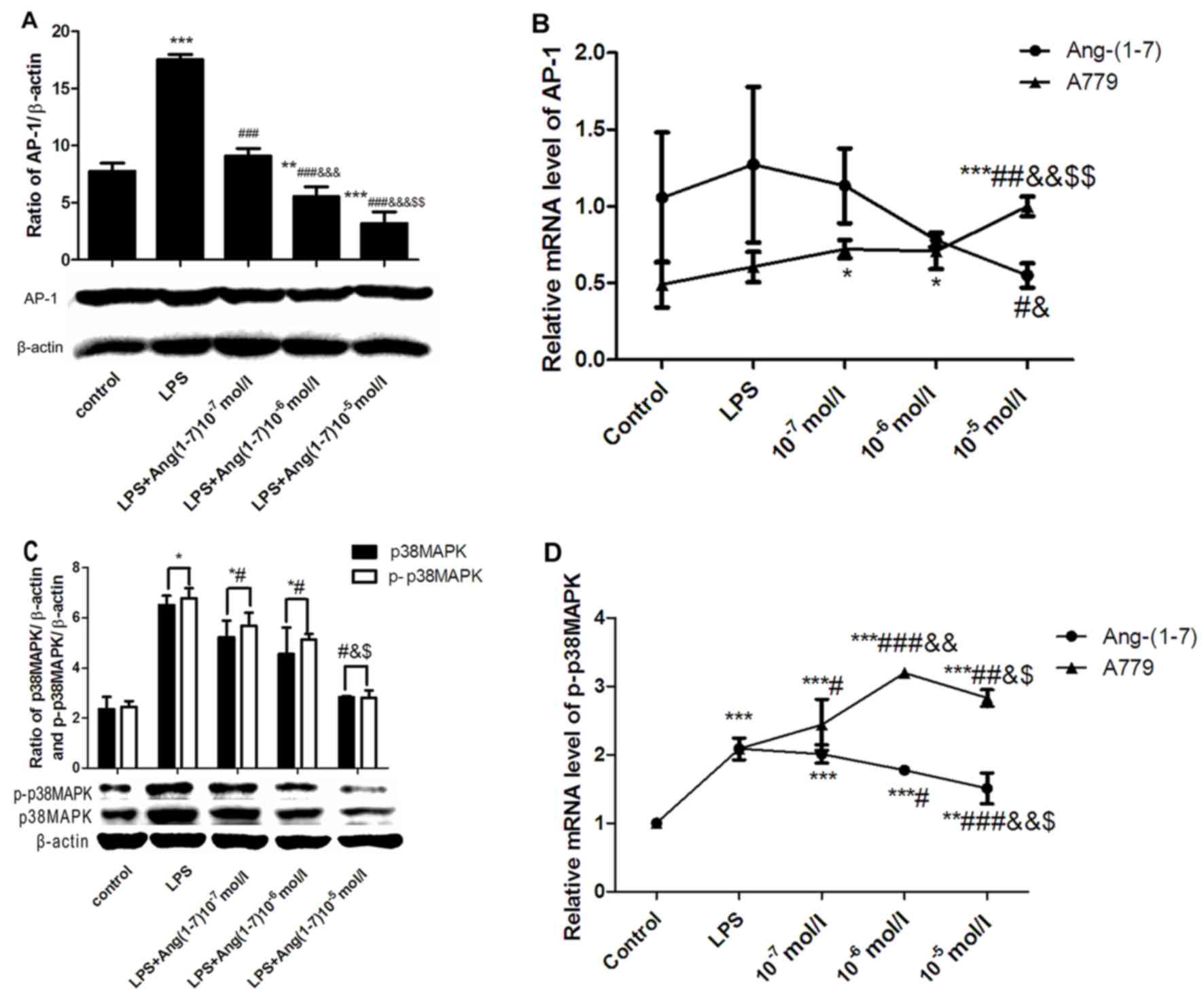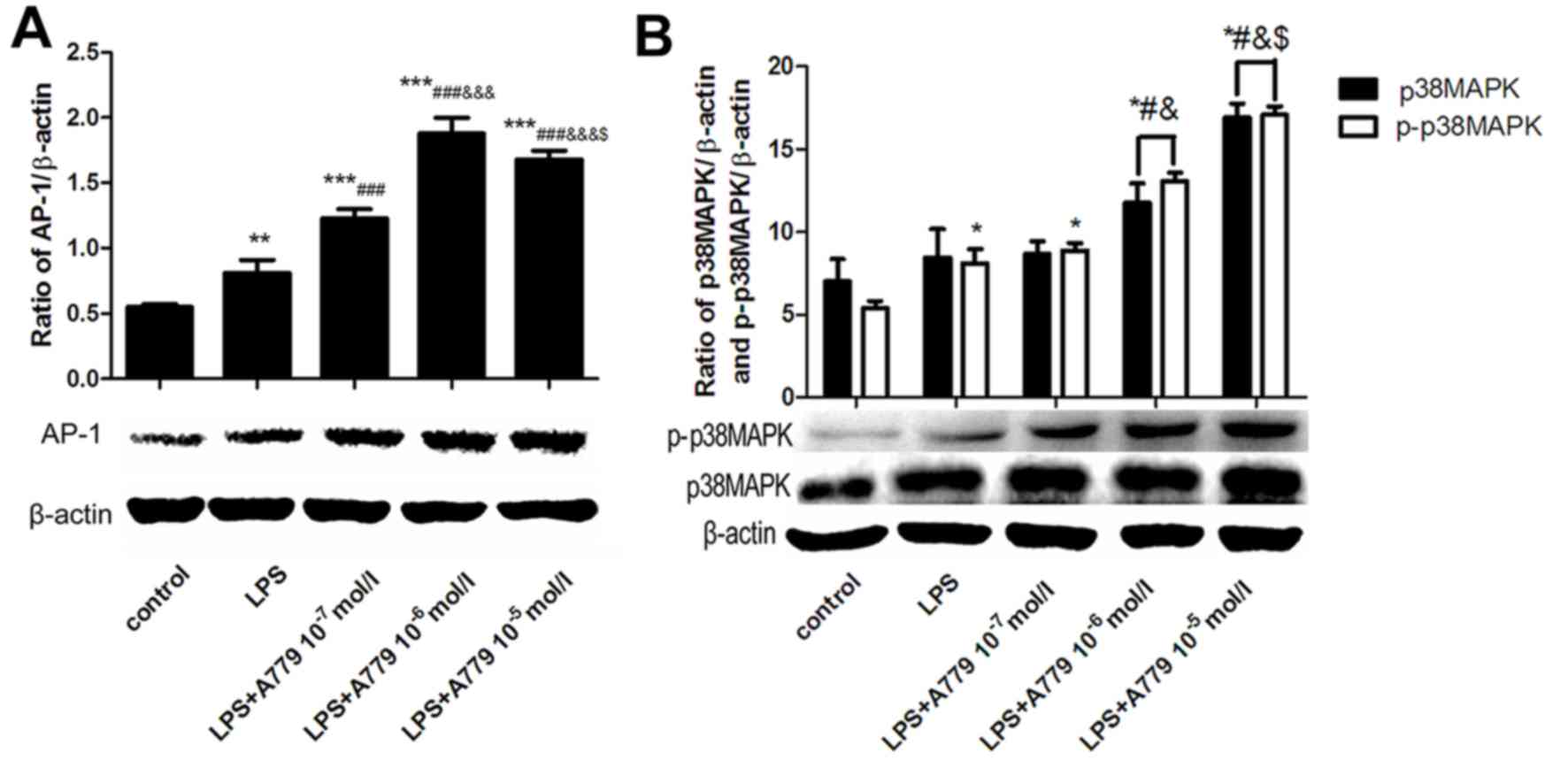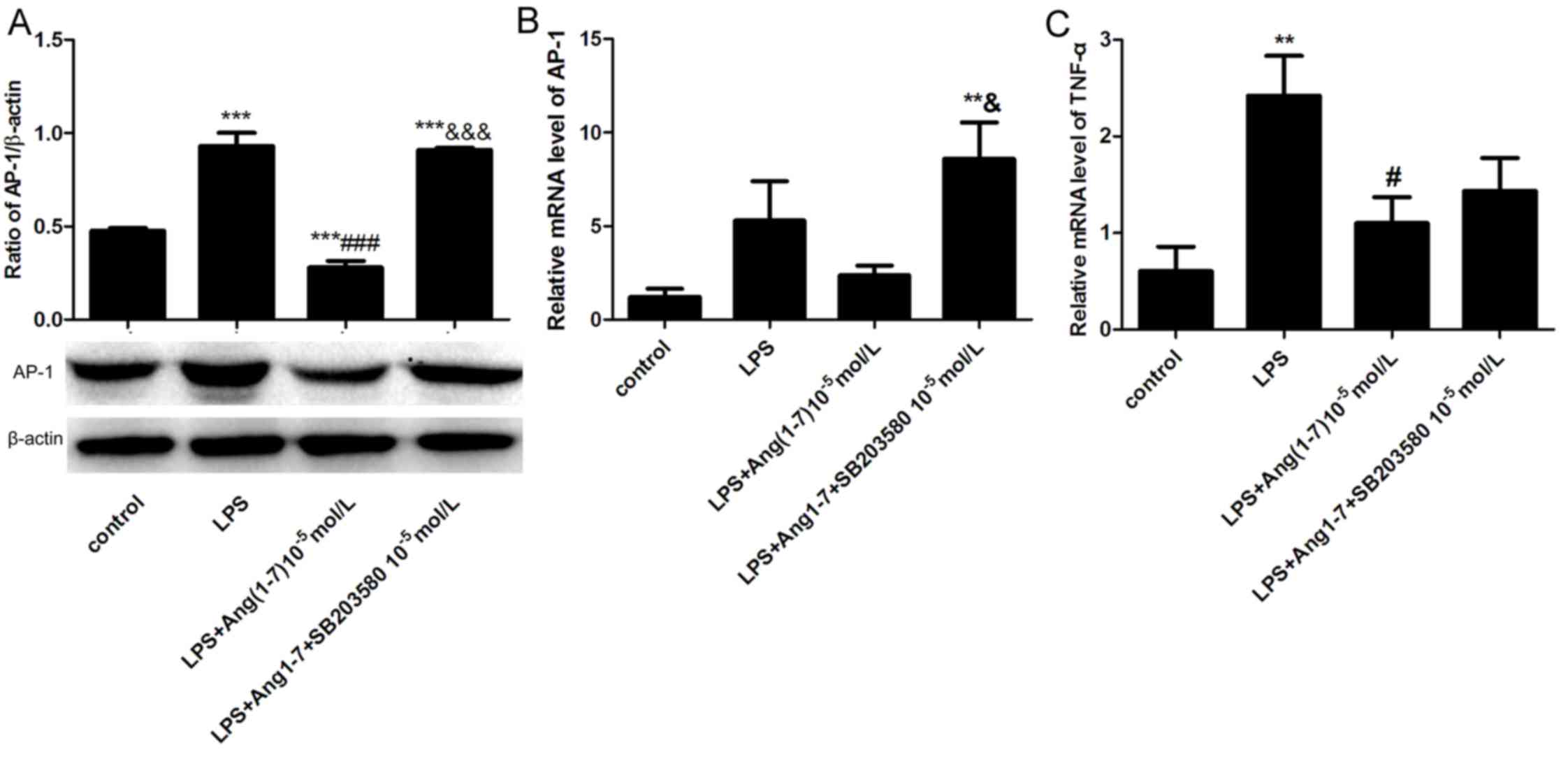|
1
|
Riedemann NC, Guo RF and Ward PA: Novel
strategies for the treatment of sepsis. Nat Med. 9:517–524. 2003.
View Article : Google Scholar : PubMed/NCBI
|
|
2
|
Chen YR, Wang X, Templeton D, Davis RJ and
Tan TH: The role of c-Jun N-terminal kinase (JNK) in apoptosis
induced by ultraviolet C and gamma radiation. Duration of JNK
activation may determine cell death and proliferation. J Biol Chem.
271:31929–31936. 1996. View Article : Google Scholar : PubMed/NCBI
|
|
3
|
Bone RC: The pathogenesis of sepsis. Ann
Intern Med. 115:457–469. 1991. View Article : Google Scholar : PubMed/NCBI
|
|
4
|
Liu LM, Liang DY, Ye CG, Tu WJ and Zhu T:
The UII/UT system mediates upregulation of proinflammatory
cytokines through p38 MAPK and NF-κB pathways in LPS-stimulated
Kupffer cells. PLoS One. 10:e01213832015. View Article : Google Scholar : PubMed/NCBI
|
|
5
|
Miyoshi M, Nagata K, Imoto T, Goto O,
Ishida A and Watanabe T: ANG II is involved in the LPS-induced
production of proinflammatory cytokines in dehydrated rats. Am J
Physiol Regul Integr Comp Physiol. 284:R1092–R1097. 2003.
View Article : Google Scholar : PubMed/NCBI
|
|
6
|
Iwashita M, Nakatsu Y, Sakoda H, Fujishiro
M, Kushiyama A, Fukushima T, Kumamoto S, Shinjo T, Kamata H,
Nishimura F and Asano T: Valsartan restores inflammatory response
by macrophages in adipose and hepatic tissues of LPS-infused mice.
Adipocyte. 2:28–32. 2013. View Article : Google Scholar : PubMed/NCBI
|
|
7
|
Santos RA, Ferreira AJ and Simões E Silva
AC: Recent advances in the angiotensin-converting enzyme
2-angiotensin(1–7)-Mas axis. Exp Physiol. 93:519–527. 2008.
View Article : Google Scholar : PubMed/NCBI
|
|
8
|
Ferreira AJ, Oliveira TL, Castro MC,
Almeida AP, Castro CH, Caliari MV, Gava E, Kitten GT and Santos RA:
Isoproterenol-induced impairment of heart function and remodeling
are attenuated by the nonpeptide angiotensin-(1–7) analogue AVE
0991. Life Sci. 81:916–923. 2007. View Article : Google Scholar : PubMed/NCBI
|
|
9
|
Santos RA, Ferreira AJ, Pinheiro SV,
Sampaio WO, Touyz R and Campagnole-Santos MJ: Angiotensin-(1–7) and
its receptor as a potential targets for new cardiovascular drugs.
Expert Opin Investig Drugs. 14:1019–1031. 2005. View Article : Google Scholar : PubMed/NCBI
|
|
10
|
Sampaio WO, Souza dos Santos RA,
Faria-Silva R, da Mata Machado LT, Schiffrin EL and Touyz RM:
Angiotensin-(1–7) through receptor Mas mediates endothelial nitric
oxide synthase activation via Akt-dependent pathways. Hypertension.
49:185–192. 2007. View Article : Google Scholar : PubMed/NCBI
|
|
11
|
Pinheiro SV, Simões e Silva AC, Sampaio
WO, de Paula RD, Mendes EP, Bontempo ED, Pesquero JB, Walther T,
Alenina N, Bader M, et al: Nonpeptide AVE 0991 is an
angiotensin-(1–7) receptor Mas agonist in the mouse kidney.
Hypertension. 44:490–496. 2004. View Article : Google Scholar : PubMed/NCBI
|
|
12
|
Souza LL and Costa-Neto CM:
Angiotensin-(1–7) decreases LPS-induced inflammatory response in
macrophages. J Cell Physiol. 227:2117–2122. 2012. View Article : Google Scholar : PubMed/NCBI
|
|
13
|
Oh YC, Jeong YH, Ha JH, Cho WK and Ma JY:
Oryeongsan inhibits LPS-induced production of inflammatory
mediators via blockade of the NF-kappaB, MAPK pathways and leads to
HO-1 induction in macrophage cells. BMC Complement Altern Med.
14:2422014. View Article : Google Scholar : PubMed/NCBI
|
|
14
|
Cho HY, Morgan DL, Bauer AK and Kleeberger
SR: Signal transduction pathways of tumor necrosis factor-mediated
lung injury induced by ozone in mice. Am J Respir Crit Med.
175:829–839. 2007. View Article : Google Scholar
|
|
15
|
Robinson MJ and Cobb MH: Mitogen-activated
protein kinase pathways. Curr Opin Cell Biol. 9:180–186. 1997.
View Article : Google Scholar : PubMed/NCBI
|
|
16
|
Scott MJ and Billiar TR:
Beta2-integrin-induced p38 MAPK activation is a key mediator in the
CD14/TLR4/MD2-dependent uptake of lipopolysaccharide by
hepatocytes. J Biol Chem. 283:29433–29446. 2008. View Article : Google Scholar : PubMed/NCBI
|
|
17
|
Klintman D, Li X, Santen S, Schramm R,
Jeppsson B and Thorlacius H: p38 mitogen-activated protein
kinase-dependent chemokine production, leukocyte recruitment, and
hepatocellular apoptosis in endotoxemic liver injury. Ann Surg.
242:830–839. 2005. View Article : Google Scholar : PubMed/NCBI
|
|
18
|
Yu T, Li YJ, Bian AH, Zuo HB, Zhu TW, Ji
SX, Kong F, Yin DQ, Wang CB, Wang ZF, et al: The regulatory role of
activating transcription factor 2 in inflammation. Mediators
Inflamm. 2014:9504722014. View Article : Google Scholar : PubMed/NCBI
|
|
19
|
Livak KJ and Schmittgen TD: Analysis of
relative gene expression data using real-time quantitative PCR and
the 2(-Delta DeltaC(T)) method. Methods. 25:402–408. 2001.
View Article : Google Scholar : PubMed/NCBI
|
|
20
|
Lambert DW, Hooper NM and Turner AJ:
Angiotensin-converting enzyme 2 and new insights into the
renin-angiotensin system. Biochem Pharmacol. 75:781–786. 2008.
View Article : Google Scholar : PubMed/NCBI
|
|
21
|
Santos RA, Ferreira AJ, Verano-Braga T and
Bader M: Angiotensin-converting enzyme 2, angiotensin-(1–7) and
Mas: New players of the renin-angiotensin system. J Endocrinol.
216:R1–R17. 2013. View Article : Google Scholar : PubMed/NCBI
|
|
22
|
Chappell MC: Angiotensin-converting enzyme
2 autoantibodies: Further evidence for a role of the
renin-angiotensin system in inflammation. Arthritis Res Ther.
12:1282010. View
Article : Google Scholar : PubMed/NCBI
|
|
23
|
Hanafy S, Tavasoli M and Jamali F:
Inflammation alters angiotensin converting enzymes (ACE and ACE-2)
balance in rat heart. Inflammation. 34:609–613. 2011. View Article : Google Scholar : PubMed/NCBI
|
|
24
|
Wösten-van Asperen RM, Lutter R, Specht
PA, Moll GN, van Woensel JB, van der Loos CM, van Goor H, Kamilic
J, Florquin S and Bos AP: Acute respiratory distress syndrome leads
to reduced ratio of ACE/ACE2 activities and is prevented by
angiotensin-(1–7) or an angiotensin II receptor antagonist. J
Pathol. 225:618–627. 2011. View Article : Google Scholar : PubMed/NCBI
|
|
25
|
Oliveira-Lima OC, Pinto MC, Duchene J,
Qadri F, Souza LL, Alenina N, Bader M, Santos RA and
Carvalho-Tavares J: Mas receptor deficiency exacerbates
lipopolysaccharide-induced cerebral and systemic inflammation in
mice. Immunobiology. 220:1311–1321. 2015. View Article : Google Scholar : PubMed/NCBI
|
|
26
|
Ma X, Xu D, Ai Y, Zhao S, Zhang L, Ming G
and Liu Z: Angiotensin-(1–7)/mas signaling inhibits
lipopolysaccharide-induced ADAM17 shedding activity and apoptosis
in alveolar epithelial cells. Pharmacology. 97:63–71. 2016.
View Article : Google Scholar : PubMed/NCBI
|
|
27
|
Chan ED and Riches DW: IFN-gamma + LPS
induction of iNOS is modulated by ERK, JNK/SAPK, and p38(mapk) in a
mouse macrophage cell line. Am J Physiol Cell Physiol.
280:C441–C450. 2001. View Article : Google Scholar : PubMed/NCBI
|
|
28
|
Veres B, Radnai B, Gallyas F Jr, Varbiro
G, Berente Z, Osz E and Sumegi B: Regulation of kinase cascades and
transcription factors by a poly(ADP-ribose) polymerase-1 inhibitor,
4-hydroxyquinazoline, in lipopolysaccharide-induced inflammation in
mice. J Pharmacol Exp Ther. 310:247–255. 2004. View Article : Google Scholar : PubMed/NCBI
|
|
29
|
Zhou L, Xue H, Wang Z, Ni J, Yao T, Huang
Y, Yu C and Lu L: Angiotensin-(1–7) attenuates high glucose-induced
proximal tubular epithelial-to-mesenchymal transition via
inhibiting ERK1/2 and p38 phosphorylation. Life Sci. 90:454–462.
2012. View Article : Google Scholar : PubMed/NCBI
|
|
30
|
Akhtar S, Yousif MH, Dhaunsi GS,
Chandrasekhar B, Al-Farsi O and Benter IF: Angiotensin-(1–7)
inhibits epidermal growth factor receptor transactivation via a Mas
receptor-dependent pathway. Br J Pharmacol. 165:1390–1400. 2012.
View Article : Google Scholar : PubMed/NCBI
|


















